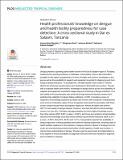Health professionals’ knowledge on dengue and health facility preparedness for case detection: A cross-sectional study in Dar es Salaam, TanzaniaHealth professionals’ knowledge on dengue and health facility preparedness for case detection: A cross-sectional study in Dar es Salaam, Tanzania

View/
Date
2023-11-21Author
Mustafa, Ummul-khair
Sauli, Elingarami
Brinkel, Johanna
Kreppel, Katharina
Metadata
Show full item recordAbstract
Dengue presents a growing public health concern in the Dar es Salaam region of Tanzania, marked by the recurring incidence of outbreaks. Unfortunately, there is little information available on the region’s preparedness in terms of health care workers’ knowledge on dengue as well as the availability of reagents and equipment essential for diagnosing and monitoring of dengue infections. To elucidate this, 78 health facilities were visited in Temeke district and structured questionnaires were distributed to 324 health care workers. The aim was to evaluate health care workers’ knowledge on dengue and to assess the availability of reagents and equipment essential for diagnosing and monitoring of dengue infections. Content validity of the questionnaire was achieved through extensive literature review and it exhibited high reliability (Cronbach Alpha coefficient = 0.813). Cumulative scores for responses on knowledge questions by health care workers were computed. Characteristics such as level of education, place of work and gender were tested for association with these scores using chi-square tests and logistics regression. Almost all health care workers (99.7%) were aware of dengue disease. However, less than half (46.9%) had knowledge scores of or over 40%. Clinicians had approximately four times higher knowledge scores than other cadres (AOR, 3.637; p-value≤ 0.0001), and those who worked in private facilities had twice the knowledge score than those working in government institutions (AOR, 2.071; p-value = 0.007). Only 8.6%, 35.6% and 14.7% of respondents reported the availability of dengue rapid tests, medical guidelines and refresher training respectively, showing a lack of health facilities readiness for the detection of dengue infections. Based on findings from this study, we recommend government authorities to build capacity of health care workers, to improve their understanding of dengue. We also urge the government and stakeholders to work together to ensure availability of diagnostic tests and other tools needed for diagnosis and surveillance of dengue
URI
https://doi.org/10.1371/journal.pntd.0011761https://dspace.nm-aist.ac.tz/handle/20.500.12479/2463
